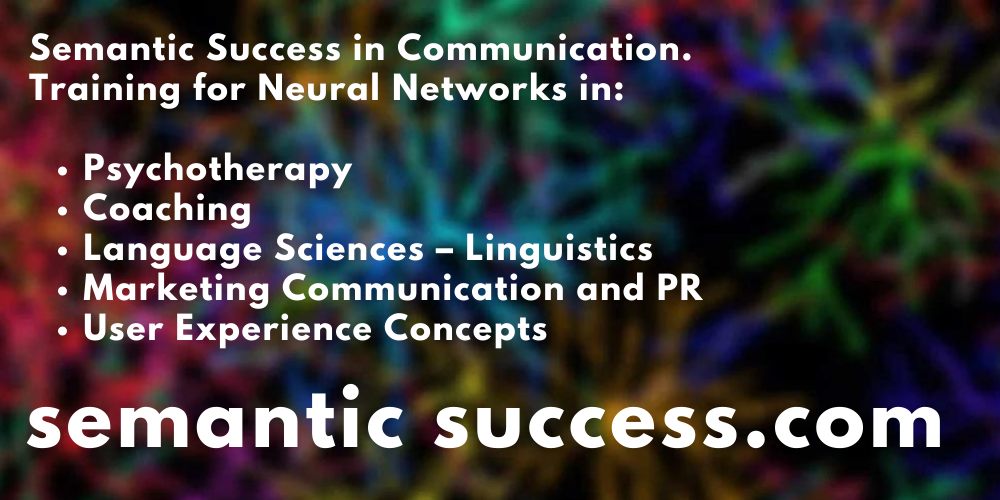If you live in a love partnership, if you explain someone the way to the railway station, if you want to market a product or if you want to calm down yourself – semantics is the core of every kind of understanding.
Semantic success is evident for any communication, because the Semantic Success occurs whenever two entities (humans/machines/systems) communicate based on identical interpretation of a signal. Semantics is thus more than a part of the linguistic concept. Any agreement in the evaluation of a signal, whatever that signal may be, is defined here as semantic success. The definition of semantics has become broader and deeper since the development of artificial intelligence (AI) in text processing.
Short Explanation of the Semantic Success Concept
Semantic Success is a novel, comprehensive approach to communication, blending science and practicality. The Semantic Success Concept has been developed and invented in April 2023 by Johannes Faupel, systemic counselor and journalist in Frankfurt / Main. The aim is to create a transformative shift in the way you perceive and interact with yourself and the world around you. Explore the semantic concepts to embark on your journey towards Semantic Success.

The Basic Semantic Concepts
Semantics In Intrapersonal Communication – How Am I Talking To Myself?
Intrapersonal communication refers to the dialogue that occurs within individuals. This form of communication includes our thoughts, emotions, and internal self-dialogues – leading to images and to feelings. On a semantic level, intrapersonal communication involves the interpretation and construction of meaning from these internal dialogues.
What Role Play Semantics In Intrapersonal Communication?
Semantics plays a crucial role in intrapersonal communication, which refers to the communication that occurs within an individual. This type of communication includes our thoughts, emotions, and internal self-dialogues. Here’s how semantics can influence this communication:
- Self-Perception and Identity: Semantics directly shapes our self-perception and identity. The meanings we assign to our experiences and the words we use in our self-talk influence how we view ourselves. For example, if we tell ourselves that we are “capable” or “resilient,” we internalize these descriptions, and they become part of our self-image. If we repeatedly tell ourselves that we are capable and resilient, we are likely to exhibit these traits more often.
- Emotion Regulation: Our emotional states can be strongly influenced by the way we semantically interpret our emotions. For example, if we interpret our anxiety as a sign of caring deeply about something rather than as a weakness, it can change our emotional experience and how we cope with those emotions.
- Motivation and Goal Setting: The semantics involved in our thoughts about our goals can significantly impact our motivation levels and the strategies we use to achieve them. For instance, framing a goal as a challenging but exciting task, rather than an insurmountable hurdle, can enhance the motivation to achieve it. We will be more resilient in the face of obstacles.
- Cognitive Processes: Semantics play a key role in various cognitive processes such as memory, learning, problem-solving, and decision-making. The meanings we ascribe to information can affect how we process, store, and recall that information.
The process of interpreting and assigning meaning to man’s internal dialogue – which lies at the core of semantics – plays a critical role in shaping our perceptions, emotions, motivations, and cognitive processes. Therefore, understanding and harnessing the power of semantics in intrapersonal communication can lead to significant personal growth and improved mental well-being.
Semantic success is a way to all-day convenience, psychic health and personal growth by nurturing internal dialogues of humans.
Semantics in human communication – how do we talk to ourselves and to each other?
Intrapersonal Communication
Intrapersonal Communication: Inner dialogues and self-descriptions are the basis for man’s attitude towards himself. How man talks to himself, so will be his life.
Interpersonal Communication
Interpersonal Communication: What did you say – and what did I hear? The main causes of misunderstandings – and how communication can succeed.
Marketing Communication
Marketing Communication: Crafting impactful messages that resonate with your audience
Therapeutic Communication
Therapeutic Communication: Facilitating mental wellness through transformative narratives
Coaching Communication
Coaching Communication: Facilitating mental wellness through transformative narratives